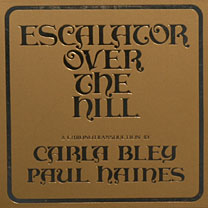History
Escalator over the Hill is more than an hour and a half long and was recorded over three years (1968 to 1971). It was originally released as a triple LP box which also contained a booklet with lyrics, photos and profiles of the musicians. Side six of the original LPs ended in a locked groove, the final track "...And It's Again" continuing infinitely on manual record players. (For the CD reissue, the hum is allowed to play for 18 minutes before slowly fading out.)
In 1997, a live version of Escalator over the Hill, re-orchestrated by Jeff Friedman, was performed for the first time in Cologne, Germany. In 1998, "Escalator" toured Europe. Another live performance took place in May 2006 in Essen, Germany.
The musicians involved in the original recording play in various combinations, covering a wide range of musical genres, from Kurt Weill's theater music, to free jazz, rock and Indian music. Writer Stuart Broomer considers this to be a summing up "much of the creative energy that was loose between 1968 and 1972". [6]
Viva acts as narrator. Jack Bruce also appears on bass and vocals. Among the vocalists is an early career Linda Ronstadt, in addition to Jeanne Lee, Paul Jones, Carla Bley, Don Preston, Sheila Jordan, and Bley's and Mantler's then-4-year-old daughter Karen Mantler.
Reception
Jonathon Cott's Rolling Stone article stated: "Like an electric transformer, Escalator Over the Hill synthesizes and draws on an enormous range of musical materials – raga, jazz, rock, ring modulated piano sounds, all brought together through Carla Bley's extraordinary formal sense and ability to unify individual but diverse musical sections by means of the editing of the record medium... The opera is an international musical encounter of the first order." [7]
Marcello Carlin, writing for Stylus Magazine , considers the album to be "the greatest record ever made." He said: "No protest, no social commentary. No expression of love, of grief, of hope, of despair. It is literally whatever you want to make of it. It is devoid of every quality which you might assume would qualify it to be the greatest of all records. And yet it is that tabula rasa in its heart, the blank space which may well exist at the very heart of all music, revealing the hard truth that we have to fill in the blanks, we have to interpret what is being played and sung, and our interpretation is the only one which can possibly be valid, as we cannot discern any perspective other than our own." [8]
This page is based on this
Wikipedia article Text is available under the
CC BY-SA 4.0 license; additional terms may apply.
Images, videos and audio are available under their respective licenses.
